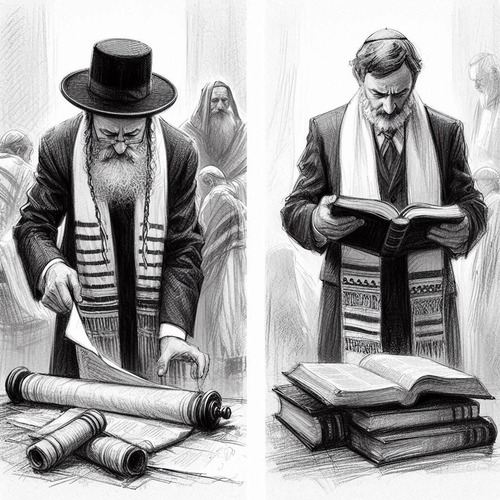The Biblical Canon: The Journey from Scrolls to Scripture
On the Canon Trail: The Journey to the Bible We Know Today
The journey to the Biblical canon, as we have it today, is a testament to the meticulous and discerning process by which the early church recognized and compiled the books that constitute Scripture. This process, guided, we believe, by the Holy Spirit and informed by criteria such as apostolic origin, orthodoxy, catholicity, liturgical use, and divine inspiration, ensured the Bible we have today is a faithful and authoritative witness to God's revelation.
This post explores the fascinating history of the canonisation process, the key figures involved, the reasons behind the exclusion of certain writings, and the rigorous criteria that guided the final selection of the canonical books we cherish today.
Understanding Canonicity: Canonicity refers to the standard by which the books of the Bible were evaluated, selected, and ultimately recognized as divinely inspired and authoritative. The canonical books are those that met specific criteria and were accepted by the early church as Scripture, serving as the foundation for Christian doctrine and practice.
Tracing the Formation of the Old Testament Canon The formation of the Old Testament canon was a gradual process that unfolded over centuries:
- Hebrew Scriptures: The Hebrew Bible, also known as the Tanakh, was already largely recognized by the Jewish community before the time of Christ. It consists of three main sections: the Torah (Law), the Nevi'im (Prophets), and the Ketuvim (Writings).
- The Septuagint: Around the 3rd century BCE, the Hebrew Scriptures were translated into Greek, resulting in the version known as the Septuagint. This translation included additional books not found in the Hebrew Bible, which later became known as the Apocrypha or Deuterocanonical books.
- The Council of Jamnia: In the late 1st century CE, Jewish scholars at the Council of Jamnia (also called Yavneh) are believed to have discussed and affirmed the canon of the Hebrew Scriptures. While the exact details of this council are debated, it is generally thought to have played a role in solidifying the Jewish canon.
The Formation of the New Testament Canon The process of finalising the New Testament canon was equally intricate and spanned several centuries:
- Apostolic Writings: The early church relied on the writings of the apostles and their close associates. The writings included the Gospels, Paul's epistles, and other apostolic letters, which were circulated among Christian communities.
- Early Church Fathers: Influential figures such as Irenaeus, Tertullian, and Origen cited and used certain books as authoritative, contributing to the recognition of these texts as canonical.
- Synods and Councils: Formal recognition of the New Testament canon occurred through the following church councils:
- Synod of Hippo (393 CE): One of the earliest councils to list the canonical books of the New Testament.
- Council of Carthage (397 CE): Reaffirmed the list of canonical books.
- Council of Trent (1545-1563 CE): In response to the Protestant Reformation, the Catholic Church definitively canonised the books of the Bible, including the Deuterocanonical books (known as the Apocrypha by Protestants).
The Criteria for Finalising the Biblical Canon The early church employed several rigorous criteria to determine the canonicity of the biblical books:
- Apostolic Origin: Books attributed to the apostles, or their close companions were given significant weight.
- Orthodoxy: The content of the books had to be consistent with established Christian doctrine and teaching.
- Catholicity: The book had to be widely accepted and used in the worship and teaching of the early church.
- Liturgical Use: Books that were regularly read and used in early Christian worship services were more likely to be included.
- Inspiration: The early church believed that the canonical books were divinely inspired, and this inspiration was recognized through the guidance of the Holy Spirit.
The Biblical Canon: Why are the Apocryphal or Deuterocanonical Books Excluded? The Apocryphal books, also known as the Deuterocanonical books by the Catholic Church, are a collection of writings included in the Septuagint but not in the Hebrew Bible. These books include Tobit, Judith, Wisdom of Solomon, Ecclesiasticus (Sirach), Baruch, 1 and 2 Maccabees, and additions to the books of Esther and Daniel.
The exclusion of the Apocryphal books from the Protestant canon was based on several criteria: The Jewish community did not recognize these books as part of their canon. Protestant reformers, seeking to align more closely with the Hebrew Scriptures, excluded them. Moreover, the Apocryphal books were not written by apostles or their close associates, a key criterion for inclusion in the New Testament canon. Some of the Apocryphal books contain doctrinal inconsistencies with the recognized canonical books. Their use in the early church was also limited.
Conclusion: Understanding the history and criteria of the canonisation process deepens our appreciation for the Bible and strengthens our confidence in its authority. For further exploration into the complexities and wonders of Scripture, stay connected with us. We shall continue to delve into the profound truths that have shaped Christian faith and practice for millennia.
Related Reads:
- Papyri and Dead Sea Scrolls: Archaeology Endorses Scripture
- Historical Reliability of the Bible: Astonishing Archaeological Finds
- Connecting the Dots: How Undesigned Coincidences Confirm Bible Reliability
- Unearthing the Past: Excavation Findings that Validate Bible Narratives
- Bible 'Contradictions': Hurdles to Faith? Not Quite
Editor's Pick

The Throne-Room Vision: Who Did Isaiah See?
The scene is unforgettable: Isaiah stands in the temple, and suddenly the veil between heaven and earth tears open. He [...]

The Angel of the Lord: Can We Be Certain It Was Christ All Along?
Throughout the Old Testament, a mysterious figure appears: the Angel of the LORD. He speaks as God, bears God’s name, [...]
SUPPORT US:
Feel the Holy Spirit's gentle nudge to partner with us?
Donate Online:
Account Name: TRUTHS TO DIE FOR FOUNDATION
Account Number: 10243565459
Bank IFSC: IDFB0043391
Bank Name: IDFC FIRST BANK






